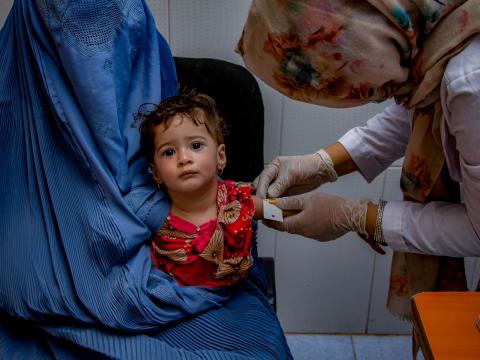Malnutrition Hunts down Families and COVID-19 Intensifies the Challenge

Amidst the hustle and bustle of Baba-e-Barq Comprehensive Health Center - CHC, in Herat Afghanistan, in a corner of the hall a middle-aged woman with an ill-nourished child in her arms, is waiting for her turn. Her name is Maleka, 45-years-old.
"I am a mother of five children. Elnaz [the malnourished girl child] is my youngest child. My husband is a daily laborer and has a moderate income. However, he lost his income due to the spread of COVID-19 in Herat. As a result, I did not have enough food to eat and could not produce sufficient milk to breastfeed Elnaz. That is why Elnaz became weak every day. She was diagnosed as severely malnourished and I could not stop worrying,” Maleka explains. “She was weak and didn’t grow much, but I did not know what to do," she added.
Maleka and her family are living in a peri urban area where there is no enough health facilities such as hospital. There is just a health facility with many clients. During the pandemic, most of the health workers has been infected to COVID-19 and quarantined. Therefore, the clinic faced a shortage of health personnel and an influx of patients.
Realizing the situation, World Vision Afghanistan under the FCPA project funded by World Vision Canada implemented an integrated multi-sector project and helped vulnerable children through secondment of health personnel. WVA provided medical and non-medical supplies including nutrition services and nutrition nurses in the only health facility of FCPA area.

When Elnaz’s weight dropped, Maleka took her to the health centre.
“My life situation was bad and the coronavirus has made it worse. It has been about three months since my baby lost a lot of weight. I heard from my neighbour that a nutrition doctor came in the clinic. I finally decided to bring her to the clinic for an examination. If the doctors hadn’t helped, I was not sure my daughter would have made it,” explained Maleka.
Over the next months, Elnaz received therapeutic food - a high-energy peanut paste, filled with nutrients and vitamins. Several times a day Maleka would feed ‘plumpy nut’ to her daughter.
Parwana, 24, is one of the nurses treating Elnaz. Today, she is checking her once again, “It will take several months to get her back to a healthy weight, but that’s why we’re here. It is the second month that I am treating Elnaz. She is getting better day by day.” Parwana, the Nutrition Nurse explains. After examining Elnaz, she packs a bag full of ‘plumpy nut’, explaining to Maleka how to best feed her daughter. “Most children love the taste and eat it while drinking lots of water,” she says.
“Each day, we have about 20 patients. Most of them are mothers brining their malnourished children. Due to COVID-19 pandemic and the bad economic situation of the families, the health facility is always busy, but we don’t close our doors until all patients are visited,” says Parwana, and waves to the next family.
As Maleka dresses her daughter and makes their way out of the clinic, a long line of other mothers are already waiting; many covered in colorful sheets or wearing traditional burqas and carrying their children in their arms.
“My daughter is getting weight since she started eating the food provided by the health center. I hope she gets healthy soon and the COVID-19 pandemic gets finished,” says Maleka with hope.
According to the United Nations Children's Fund (UNICEF), the number of malnourished children in Afghanistan increased from 690,000 in January this year to 780,000; the figure shows a 13 percent increase. Four out of 10 Afghan children currently suffer from malnutrition in Afghanistan. [i]Malnutrition occurs when families continue to follow poor diets. Human food security has been further affected by the COVID-19 pandemic, and this has had social implications.
Women and children have been disproportionately affected by the COVID-19 pandemic. Food insecurity, malnutrition and lack of access to health, hygiene and sanitation facilities worsened the situation for the vulnerable households. As part of response to COVID-19, World Vision Afghanistan helps vulnerable people by scaling up preventive measures and strengthening health facilities in destitute communities through provision of medical and non-medical supplies, secondment of health workers and community awareness campaigns on Corona Virus.
[i] https://www.unicef.org/press-releases/unicef-comment-malnutrition-afghanistan-geneva-palais-briefing